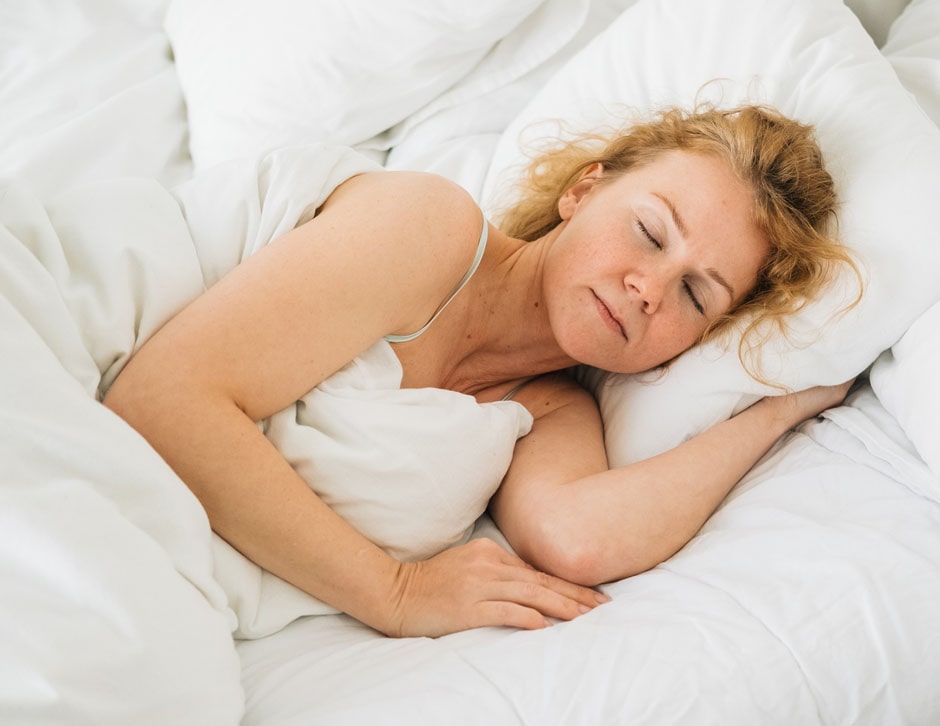
Quick overview of what you’ll learn from this blog post:
- What is LDN?
- How does LDN produce better sleep?
- Can LDN ever cause sleep problems?
- What are some other tips for more restful sleep?
What Is LDN?
Low Dose Naltrexone (LDN) is an oral medication that works with the immune and endorphin systems to create various therapeutic effects. LDN is commonly used to lower markers of inflammation in the body, reducing chronic pain and fatigue. There are very few side effects.
How Does LDN Produce Better Sleep?
Low Dose Naltrexone is commonly prescribed at doses between 0.5-9mg, with the mostly commonly used dose of 4.5mg. At such a low dose, LDN works by briefly blocking opioid receptors in the brain for a few hours. A rebound effect occurs, causing an increased production of endorphins. This results in an enhanced feeling of well-being, as well as reduced inflammation and pain. LDN also has a direct effect on glial cell inflammation by blocking TLR4, thereby reducing inflammation in the brain (1).
Since your body is no longer focused on inflammation, pain, irritability, or other problematic symptoms that may affect your sleep quality, most patients report that they sleep better and more deeply. The reduction in inflammation is also thought to help balance the neurotransmitters in the brain, such as dopamine, serotonin, and GABA (2).
Another reason LDN can help to produce better, more restful sleep is due to its ability to reduce cortisol levels in the evening (which can interfere with sleep). Dr. Wilfrid N. Raby, Adjunct Clinical Assistant Professor for the Department of Psychiatry and Behavioral Sciences at the Albert Einstein College of Medicine shared his experience using LDN “to modulate sleep, because you are abolishing that cortisol surge in the evening, which is what sustains the sympathetic activity and contributes to the delay in falling asleep.” He added, “LDN is short-acting, causing a rebound surge of cortisol in the morning that contributes to alertness during the daytime, but there is also improved sleep at night.”
Can LDN Cause Sleep Problems?
It is true that the most commonly experienced side effect from LDN is sleep disturbance. However, for most patients, it is mild and subsides with continued use of LDN. In the experience of our CMO, Dr. Sajad Zalzala, some patients with sleep problems actually report improved sleep when starting LDN.
On the rare occasion when sleep disturbance from LDN is more troubling, switching it to the daytime can be very helpful. For more information on tips to remedy possible side effects, click here.
What Are Some Other Tips for More Restful Sleep?
In addition to possible help from LDN, there are other tips well within your control to achieve better, more restful sleep. We’ve listed some of our most effective tips below:
- Eliminate caffeine after 12pm. Caffeine blocks adenosine, which is what triggers sleep onset. Drink herbal teas for something soothing in the evening
- Stick to a specific sleep and wake up cycle, even on the weekends. This healthy habit helps to reset your circadian rhythm (your body’s internal clock).
- Utilize blue light filtering glasses (even during the day). Decreasing the amount of blue light you are exposed to throughout the day reduces stimulation and makes falling asleep easier. Blue light also blocks the body’s ability to make melatonin.
- Get a minimum of 30 minutes of bright daylight exposure per day. This is another healthy habit to keep your circadian rhythm set and improve hormonal response.
- Place your cell phone and other electronics as far from your bed as possible. Put all devices in Airplane mode, if possible. Additionally, avoid putting your WiFi router anywhere near your sleeping space. Excessive EMF can cause added stress to the body, which can cause premature aging.
To learn more about the science behind LDN, click here.
To request an LDN prescription, click here.
Sources:
- https://ldnresearchtrust.org/sites/default/files/LDN_Mechanism_Of_Action_Pradeep_Chopra_MD.pdf
- https://ldnresearchtrust.org/sites/default/files/DR-Mark-Shukhman-Dr-Andrey-Lev-Weisberg.pdf
Disclaimer: Low Dose Naltrexone (LDN) has not been approved by the FDA for these uses, but there are multiple studies that have shown these benefits. You should always consult with a licensed physician before taking any drug.
FAQs
Why is sleep important for longevity?
Sleep is the time when our restores and regenerates from the day’s damage, allowing everything from our cardiovascular system to our brain to work at their best. How well we sleep is becoming an increasingly significant factor of our longevity and overall health. In fact, insufficient sleep is linked with many age-related diseases, like cardiovascular disease, stroke, and diabetes. On the other hand, healthy sleep can add up to 5 years to our lifespan. The effect that our sleep has on our stress levels is also clear: less sleep equals more stress. That’s not to mention Daylight Saving Time and our health. Missing out on sleep is becoming more and more like missing out on a doctor’s appointment.
Is there anything besides LDN that can help me sleep?
NAD+ is also shown to improve healthy sleep. NAD+ is a coenzyme that’s found in every living cell, playing a pivotal role in cellular reactions by carrying electrons between cells. One of these reactions determines our circadian rhythm, or our natural sleep cycle. As we age, our NAD+ levels start to decline, which can cause various disruptions to otherwise healthy bodily functions, including how we sleep. NAD+ therapy can restore our NAD+ levels and improve our sleep patterns, helping us get a full night’s sleep consistently.
Why does good sleep become more difficult as we age?
Our energy levels also decline as we age, which means that our body needs more frequent rest to restore lost energy. But this isn’t true for everyone – a healthy diet, regular exercise, and avoiding alcohol can all help prevent declining energy levels. Others may be experiencing low energy as a result of cellular factors such as low NAD+ levels.
